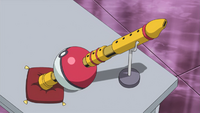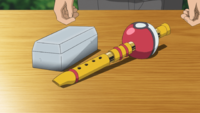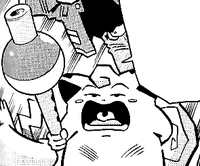Poké Flute
A Poké Flute (Japanese: ポケモンのふえ Pokémon Flute) is a key item from the Pokémon games. It looks like a yellow recorder with a Poké Ball near the bottom.
In the Generation I Pokémon games and their Generation III remakes, this item is given to the player as thanks by Mr. Fuji after they rescue him from Team Rocket in the Pokémon Tower. In Pokémon X and Y, the Poké Flute is obtained from Mr. Butler at the Parfum Palace to be delivered to its original owner. In Pokémon Snap, Professor Oak will reward the player with a Poké Flute after obtaining a total score of 125,000 points or higher for all the photos in the Pokémon Report.
Usage

In the field
A Poké Flute's single purpose in the field is to wake up sleeping Pokémon, specifically two Snorlax sleeping on Route 12 and Route 16. Doing this is the only way to progress southward in the game, since these Pokémon are blocking the routes, as well as the only way to battle a wild Snorlax. In Pokémon Yellow, it can also wake up the player's Pikachu. If used outside of battle, it will play a "catchy tune".
In the Generation II Pokémon games as well as their remakes Pokémon HeartGold and SoulSilver, this purpose is fulfilled by the radio function of the Pokégear. An EXPN Card is required for this, and the Poké Flute is on channel 20 in Kanto.
In Pokémon X and Y, the player has to get the Poké Flute from the Parfum Palace and deliver it to its owner, a Black Belt, who will use it to wake up a Snorlax that is blocking Route 7. Unlike in the Generation I games and their remakes, the Poké Flute isn't a keepable item, and will only be in the player's possession while it's being delivered.
In battle
A Poké Flute is a reusable item that cures all Pokémon in the battle of Sleep, including the opponent's Pokémon.
This purpose is fulfilled by the Blue Flute in Pokémon Ruby, Sapphire, and Emerald, and all Generation IV main series games.
Other
In Pokémon Snap, playing the Poké Flute will wake up sleeping Pokémon and may make them dance or pose for the player. There are three songs which the Poké Flute can play in this game, and Pokémon respond differently to each.
Flavor text
|
In the anime
In the main series
A Poké Flute was used by the hippie in Wake Up Snorlax!. He performed concerts with it in exchange for food. Later, he used it to help restart the flow of a river by waking up a Snorlax that was blocking the river.
Another Poké Flute appeared in Awakening the Sleeping Giant!, under the ownership of Lord Shabboneau. It is used in an annual festival involving a Snorlax living in the area, but, unfortunately, it had been taken away by the egocentric Princess Allie from the Parfum Palace. After a series of many-sided events, Ash and his friends managed to get the Flute back and return it to Lord Shabboneau so he could start the festival. Team Rocket, believing the Flute could actually control Snorlax, tried to steal it in order to gather themselves an army of Sleeping Pokémon, but the Flute was soon recovered, allowing the festival to be successfully completed.
Pokédex entries
|
In Pokémon Origins
The Poké Flute was seen two times, although briefly, in Pokémon Origins. It first appeared close to the end of File 2 - Cubone, where Mr. Fuji gave it to Red as a thanks for saving him and the Pokémon Tower from Team Rocket. Red later used the Flute in File 3 - Giovanni to wake up a Snorlax, which he presumably caught.
In the manga
In the Pokémon Pocket Monsters manga
A Poké Flute appeared in Get Snorlax!!.
In the Pokémon Zensho manga
A Poké Flute appeared in Celadon City, where it was given to Satoshi by Mr. Fuji.
In the TCG
- Main article: Pokémon Flute (Base Set 86)
Pokémon Flute was introduced as a Trainer card at the beginning of the Pokémon Trading Card Game. First released in the initial Japanese Expansion Pack, it later debuted in English in the Base Set, with both prints featuring an illustration by Keiji Kinebuchi. Pokémon Flute allows the player to choose a Basic Pokémon from their opponent's discard pile and add it to their opponent's Bench.
In other languages
| ||||||||||||||||||||||||

|
This item article is part of Project ItemDex, a Bulbapedia project that aims to write comprehensive articles on all items. |




